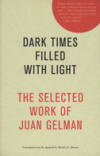Dark Times Filled with Light
Dark Times Filled with Light is a brilliant collection of poems, spanning four decades, by Argentinean poet Juan Gelman. Virtually unknown to English-speaking literary audiences, Gelman is the recipient of relatively recent international acclaim, including a Cervantes Prize and Argentine National Poetry Prize, and his work continues to be translated into English. More impressive, however, than Gelman’s vitae is the sheer poetical power and pull of his work. Gelman’s poetry negotiates the boundaries between politics and history, between voice and borders, and gives an enigmatic narrative thread to the life and times of a poet in exile. It is impossible to not appreciate the sophistication and pathos that is etched in the work.
Dark Times Filled with Light is a brilliant collection of poems, spanning four decades, by Argentinean poet Juan Gelman. Virtually unknown to English-speaking literary audiences, Gelman is the recipient of relatively recent international acclaim, including a Cervantes Prize and Argentine National Poetry Prize, and his work continues to be translated into English. More impressive, however, than Gelman’s vitae is the sheer poetical power and pull of his work. Gelman’s poetry negotiates the boundaries between politics and history, between voice and borders, and gives an enigmatic narrative thread to the life and times of a poet in exile. It is impossible to not appreciate the sophistication and pathos that is etched in the work.
Dark Times Filled with Light draws its collection from Gelman’s previously published work; chronologically, Dark Times Filled with Light begins in 1956 (“Watching People Walk Along”) and finishes with excerpts from The Wages of the Profane (1984-1992). It is clear that Gelman is working with specific themes in the longue duree—most broadly, he focuses on the voice created through the inherent tension in the space between two antitheses. Specifically, Gelman plays with the pairings of presence and absence, of life and death; and the ideas of justice, mercy, and resolution.
The complexity and multi-layered meaning of Gelman’s work and his variations along these themes in several of his pieces manifest throughout the book. In “One Man’s Wake,” Gelman describes a man: “He goes around concerned more than usual / about time, life, other minor things like being, / dying without having found himself.” This brilliant play of words, a pun noir, if you will, illustrates Gelman’s exploration of the space between life and death and death and resurrection—where “wake” is an exploration of that space between the endpoints. In “Facts” (written as part of Facts in Buenos Aires and Rome between 1974 and 1978), one sees the despair and loneliness that a poet-in-exile wrote to:
this explains why so far no line of poetry has overthrown
any dictator or bureaucrat not even
a small dictator or bureaucrat / and also explains
how a verse can be born from the cross between a stone and a bright glow in autumn or
a cross between the rain and a ship and also from
other crossings no one would know how to predict / in other words
births / marriages / the
shots fired by neverending beauty
Again, Gelman’s brilliant play with double meanings of words, as well as the story within the poem itself, emphasizes the narrative role that he assigns to the poets. One might conclude that he sees the role of the poet to be a long and difficult one; one can feel Gelman’s almost despair in that the line of the poetry doesn’t immediately or completely overthrow corruption and “the regime’s legally established disorder”; the poet’s role is one that is ready with the foils of the hideousness of the corrupt regime. The poet’s role is one with “neverending beauty.”
Most poignant, perhaps, is the voice that Gelman gives to the “disappeared” within Argentina’s immediate history. In the introduction to Dark Times Filled with Light, the reader is told of Gelman’s family and the consequences that the Argentinian regime had for him, personally—his son and daughter-in-law “disappeared” and his granddaughter was given to a pro-government family in Uruguay. Gelman himself lived in Europe, the United States, and Mexico during his own exile. (Gelman was reunited with his granddaughter in 2000.) In “Alone” (written in Rome, in January-March 1980):
you’re alone / my country / without
the comrades you lock up and destroy / you hear
them slowly being emptied of the love
they have left / they loosen their grip
on their turn to die / dream they’re being dreamed / quieted /
they’ll never see other faces growing /
leaning out / continued / in this sun / some day in the sun of justice
Here, more than any other place, we can see Gelman giving a narrative voice to those that do not have one. Here, Gelman negotiates the lines between history and politics and provides an identity and sense of being and of purpose. Here, we are left to question if history and politics provide a place for justice and redemption.
A true sense of gravitas is inherent in Gelman’s work—a sense that he wishes the stories of Argentina told. And he wishes for us to listen. Dark Times Filled with Light is a necessary and essential read, and Juan Gelman is a necessary and essential poet.





